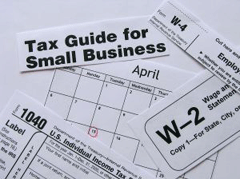Following the Paper Trail
Air Date: Week of April 10, 2009

International Paper Company’s kraft process pulp and paper mill in Georgetown, South Carolina.
The paper industry is profiting from an obscure law intended to reduce dependency on fossil fuels. Only to qualify for the tax credit, they are using more fuel; they could gain as much as eight billion dollars from the government by doing so. Living on Earth Host Steve Curwood turns to The Nation magazine's DC editor, Christopher Hayes, to lead him through the paper trail.
Transcript
[NEWSBREAK MUSIC: Boards Of Canada “Zoetrope” from “In A Beautiful Place Out In The Country” (Warp Records 2000)]
ANNOUNCER: Support for Living on Earth comes from the National Science Foundation and Stonyfield Farm.
[THEME]
CURWOOD: From the Jennifer and Ted Stanley Studios in Somerville, Massachusetts - this is Living on Earth. I’m Steve Curwood.
This time of year many people are still looking for last minute ways to cut their tax bill. But any deduction typical citizens can come up with is probably pocket change compared with the tax bonanza paper companies have discovered. They are cashing in on a tax credit intended to reduce fossil fuel use by using… more fossil fuels!
Acting on a tip from a hedge fund friend, Christopher Hayes followed the paper trail. He’s the Washington editor of The Nation, and he joins me now from the capital.
Chris, welcome to Living on Earth!
HAYES: Thanks for having me.
CURWOOD: So, as I understand it, we could pay paper companies as much as eight billion this year from the public treasury to use more fossil fuel? I mean how did this happen?

The paper industry gets a big boost this tax season—and not just from millions of print-outs of tax forms.
Well, along comes the paper industry. The paper industry has this distinct way of producing paper, it’s called the Craft process. It’s actually kind of a neat, closed loop. And what they do is they separate out the wood chips, they separate out the material that’s gonna be made to turn into pulp and paper, and the rest of the material is left in this water, it’s called black liquor, which is a great evocative name, and it’s full of a lot of carbon particulate, and so it burns. And they use that black liquor as the fuel that powers the rest of the industrial process to turn the pulp into paper.
CURWOOD: Wait a second, Chris, this is a renewable fuel. I mean if it’s coming from trees, they grow back again, this is a good thing already.

Christopher Hayes (Photo: Lindsay Gallup, TimeOutChicago)
Well, they churn through so much of this stuff, the numbers, the amount of money they’re getting from the government, is extraordinary. You know, eight billion is one sixth of the total amount of money we spend on foreign relations and foreign policy. It’s about one quarter of what it costs to insure the uninsured. I mean, it is a tremendous amount of money. International Paper, which is one of the largest paper companies in the world, announced on March 25th that for one month of running fifteen of their plants with this new mixed fuel, they got a $71 million check from the United States government. Now keep in mind, this is a company that lost $450 million in the last quarter of ’08. So, the money to be made by gaining this tax loophole is far far greater than the money to be made in actually producing paper.
CURWOOD: Now, you’ve talked to some paper industry folks, what do they have to say about this deal?
HAYES: Frankly, I think the paper industry is hurting right now. And I think they’re grabbing at any lifeline they can get. I don’t think they’re going to be particularly apologetic on their end for manipulating a tax credit in a fully legal way to increase the profits for their company.
CURWOOD: They don’t feel like they are kind of, you know, [SNORTS] snorting at the trough here?
HAYES: Well, I mean, maybe they do if you got a few drinks in them [LAUGHS] and they weren’t talking to a reporter on the record. I mean, the spokesperson for International Paper, when I said to her, “Well, isn’t it a little weird, don’t you think, that you’re adding diesel fuel to obtain a tax credit designed to incentivize the reduction of fossil fuel?” And she said, quote, “It is what it is.”
CURWOOD: The writers of the bill can’t be very happy. I can’t imagine that everyone on Capitol Hill is happy about this either. Who, if anyone, is taking action?
HAYES: So, there is a widespread consensus that this is absolutely a perversion of the law’s intent. And the day after my story came out, the government relations office of the paper industry trade group sent out a very panicked memo to their members saying that they had heard that Senators Baucus and Grassley, who are the chair and ranking member of the finance committee, are considering closing off the loop hole and that paper companies should consider contacting their senators and put their shoulder to the wheel to try to keep it in place.
CURWOOD: What does the White House say about this?
HAYES: The White House had no comment on it. They referred me to Treasury. Treasury has been inundated and difficult to get a comment out of.
CURWOOD: Well, we tried the White House asking about your story, so far we haven’t had any luck either.

International Paper Company’s kraft process pulp and paper mill, located in Georgetown, South Carolina, one of the largest of its type in the world.
CURWOOD: Chris Hayes is the Washington editor of The Nation who wrote “Pulp Non-Fiction.” Well Chris, do you have an alternative for the use of paper at your office? You may have trouble getting supplies now.
HAYES: [LAUGHS] I know. Well, you know, the funny thing is that as a paper magazine, we’ve been around since just after the end of the Civil War, lower paper prices probably indirectly help us. So I may have been biting the hand that proverbially feeds me a little bit. But, in my own personal life, I have a rule, which is that I don’t write things down on paper unless I want to forget them.
CURWOOD: Chris Hayes, the Washington editor of The Nation. Thank you.
HAYES: Thank you.
Links
Living on Earth wants to hear from you!
Living on Earth
62 Calef Highway, Suite 212
Lee, NH 03861
Telephone: 617-287-4121
E-mail: comments@loe.org
Newsletter [Click here]
Donate to Living on Earth!
Living on Earth is an independent media program and relies entirely on contributions from listeners and institutions supporting public service. Please donate now to preserve an independent environmental voice.
NewsletterLiving on Earth offers a weekly delivery of the show's rundown to your mailbox. Sign up for our newsletter today!
 Sailors For The Sea: Be the change you want to sea.
Sailors For The Sea: Be the change you want to sea.
 The Grantham Foundation for the Protection of the Environment: Committed to protecting and improving the health of the global environment.
The Grantham Foundation for the Protection of the Environment: Committed to protecting and improving the health of the global environment.
 Contribute to Living on Earth and receive, as our gift to you, an archival print of one of Mark Seth Lender's extraordinary wildlife photographs. Follow the link to see Mark's current collection of photographs.
Contribute to Living on Earth and receive, as our gift to you, an archival print of one of Mark Seth Lender's extraordinary wildlife photographs. Follow the link to see Mark's current collection of photographs.
 Buy a signed copy of Mark Seth Lender's book Smeagull the Seagull & support Living on Earth
Buy a signed copy of Mark Seth Lender's book Smeagull the Seagull & support Living on Earth

